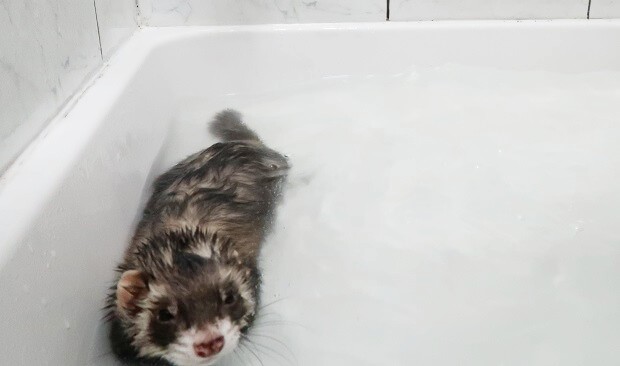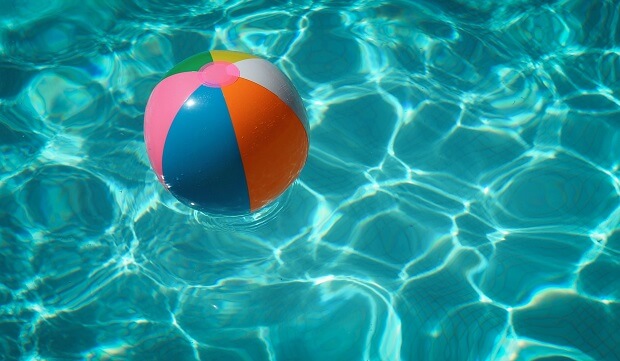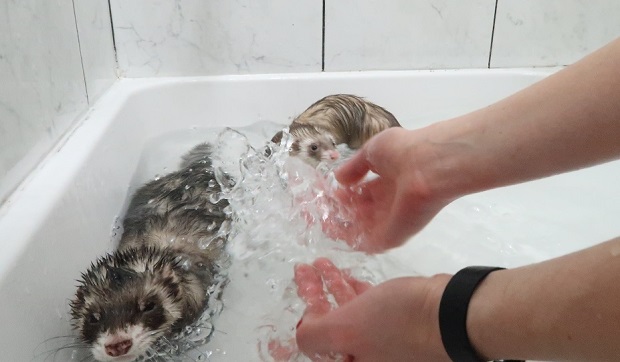Do ferrets like water?
Can ferrets swim?
These are only a few questions every ferret owner asks himself. In this post, I want to focus on ferret water-related questions. So, we will talk about swimming ferrets, playing ferrets in water, do they like it, and what else they do near the water. We will talk about pools, buckets of water, even water bowls and ferrets!
TABLE OF CONTENTS
Do Ferrets Like Water?
In general, most ferrets like water. But, like everything else with ferrets, it is not a rule. There are two types of ferrets, the ones that love water and the ones that hate it. You can never know with your own ferret until you let him try. Ferrets that like water can play in it, swim in it, even dive and they will have a lot of fun. That is great for hot summer days.

With enough encouragement, you can entertain your ferret with a small pool and ferret treats to keep his body away from heatstroke. Ferrets that don’t like water will try to get out as soon as possible. My ferret Frida didn’t like water. She would swim in the bathtub for 30 seconds, then she would dive and pull out the bath plug when she was done.
How To Know If Your Ferrets Like Water?
If you are curious whether your ferret likes water or not, you can easily test that by putting your ferret in water. Since you aren’t aware of how your ferret will react, make the entire process smooth and slow. That means you can’t put your ferret in the water at once, do it gradually.
Put your ferret in the water, back legs, and tail first, then the rest of the body. Do it slowly so your ferret can get used to the water. Look at your ferret and monitor his reaction. If your ferret likes water, he will start swimming around. If he doesn’t he will swim back to you or around looking for a way out of the water.
Can Ferrets Swim?
Yes, ferrets can swim, although not all of them enjoy it. Ferrets that love swimming do it in many short sessions, so swimming sessions shouldn’t last longer than a couple of minutes. That is why it is important that the water isn’t too deep for them and that they can get out of it easily.

They can swim in bathtubs, pools, oceans, and rivers. The smart move is to test your ferret in the bathtub first, then gradually (if he likes water) move him into a bigger body of water. Don’t put it in rivers and oceans with strong currents or big waves. Your ferret’s safety should come first.
How To Keep Your Ferret Safe In The Water?
There are a few things you can do to keep your ferret safe and the first and the most important one is to monitor your ferret. Don’t leave him alone under any circumstances, especially if you are outside.
Swimming In The Bathtub
The bathtub is the safest option because you can control the temperature and the depth of the water. Make sure the temperature is slightly warmer than the one you would put for yourself because their body temperature is higher than ours. Also, make sure to watch your ferret’s reaction when you are placing him in the water, it will tell you if the water is too cold.

When it comes to depth, don’t put too much water. The perfect depth is the one your ferret can swim, but also stand so he can rest when tired. Most ferrets swim only when they have to so it is a good option to provide them a place to stand so they can calm down. Don’t forget to give your ferret an exit route so he can go out once he is done.
Swimming In The Pool
Pools aren’t the best places for ferrets to swim because they are full of chemicals. Chlorine can irritate ferret’s skin and make them ill if he drinks the water so keep an eye on your ferret. If the pool has skimmers, make sure the ferret doesn’t get too close to them so it won’t get stuck.

Also, make sure the ferret has an exit route. That is challenging since most pools are deep and the only way you can exit is through the ladder. If there is no exit route for your ferret, you have to think of something. You can make a small plastic construction and attach it to the side of the pool.
Swimming In The Lake/River
When you are with your ferret outside near the lake or the river, always keep him on the leash. That way your ferret won’t get lost in or out of the water. You can read about leash training in my post about the ferret harness and leash guide. The lake is a better option for your ferret since it is calmer.

But, if you have a river near you, you can try that too. Find a spot on the river shore where your ferret can easily get in and out of the water. Make sure the water is calm so your ferret can enjoy it without fighting the current. Don’t forget to keep your eyes on your ferret at all times. Rinse your ferret when he is done, especially if there was mud in the bottom of the river.
Swimming In The Sea/Ocean
The rules are very similar to ferret swimming in the river. When a ferret is swimming in the ocean, you have to keep him under control and leave a harness on the ferret. The harness should be small and light so it won’t drag your ferret under the surface.

Make sure there are no waves so your ferret can swim without trouble. Also, make sure your ferret can exit the ocean once he is done. Due to the salt in the water, you have to rinse your ferret thoroughly after this swimming session.
When Should You Wet Your Ferret?
There aren’t many reasons to wet your ferret because ferrets bathe themselves just like cats. So, the most common reason to wet your ferret is to cool him on a hot summer day. The second one is to clean him when he gets really dirty. That can be from digging in your plant, rummaging through your trash bin, etc.
Lower The Body Temperature
Ferrets can’t handle hot weather. They can easily have heatstrokes and to prevent that, you can cool your ferret off by keeping his body temperature down. One of the ways to do that is to wet your ferret. But, that doesn’t mean putting it in cold water. Keep the water temperature the same as before so your ferret can’t get sick. You can find out more about surviving hot summer days in my post about ferret heatstrokes.

Bath A Ferret When He Gets Dirty
Bathing ferrets isn’t something you should do. They don’t require regular baths, they keep their fur clean by constant licking and grooming. But, if a situation requires a bath (dirty ferret) then you should draw a bath for him. Keep in mind that their skin is very sensitive so you have to use a mild shampoo to avoid skin irritation. You can read more about when and where to do it in my post about bathing ferrets.

Keep Ferrets Entertained
If your ferret loves water, then you can give him a small pool party every now and then. Fill a small tank with water (no shampoo), put toys and treats inside, and let your ferret go wild. He will chase the toys, dive for treats and have a blast. If you decide to do that, place a towel under the tank to avoid spilling water all over your room. Once your ferret is satisfied, tired, and dry, remove the “pool” and relax with your ferret.

FAQ
Why Is Ferret Digging In Water Bowl?
Ferrets digging in a water bowl doesn’t mean your ferret wants to swim. It can mean many things, but mostly it is because he simply wants to dig. Another reason is that there is too much water in the bowl so he will make sure the water level is up to his taste. You can easily test that by putting a large amount of water in the bowl and watch his reaction. Then, place a small amount of water and observe if your ferret will dig again or not.

Do Ferrets Like To Play In Water?
If your ferret loves to swim, then he will love to play in the water too. You can play with him by placing a couple of toys in the water and watch him chase them. Also, you can put a few treats on the bottom of the tank (not too deep) and watch your ferret dive to get them. That game with treats was the only way my ferret Frida would get inside the water.
Conclusion
Even though ferrets in general like water, it doesn’t mean your ferret will like it too. So, test your ferret and see if water activities are interesting to him. If your ferret doesn’t like to swim in the bathtub, he probably won’t like it in the river or the ocean. Don’t force your ferret in the water if that is not something he wants to do. So, does your ferret like water? Share your experience with us in the comments below and subscribe to the Friendly Ferret newsletter for more ferret articles!





















Leave a Reply